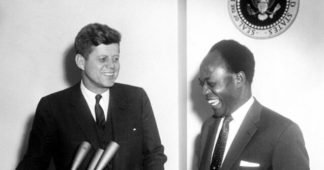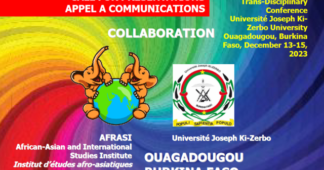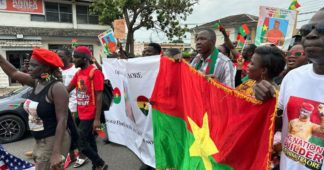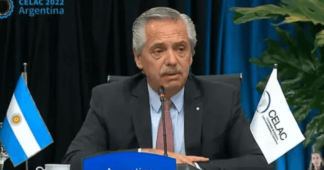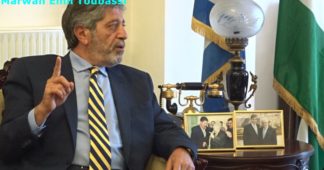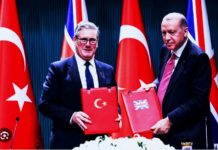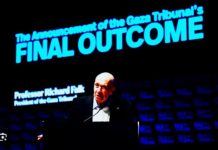by Nicholas Mwangi
Oct 25, 2025
The anniversary of the Manchester Congress calls for reflection on its enduring significance and the meaning of Pan-Africanism in today’s world, a time when the struggles for sovereignty, unity, and liberation remain as urgent as ever.
October 2025 marks eighty years since the historic Fifth Pan-African Congress convened in Manchester, United Kingdom, in 1945. This congress became a revolutionary turning point in the global struggle against colonialism and imperialism. It brought together a remarkable group of African and Caribbean thinkers, workers, trade unionists, and political leaders, including Ghanaian leader Kwame Nkrumah, Caribbean-born US-based communist leader George Padmore, Trinidadian historian CLR James, Kenyan freedom fighter Jomo Kenyatta, Jamaican Pan-Africanist Amy Ashwood Garvey, and ITA Wallace-Johnson, who collectively articulated a new vision of African liberation and self-determination.
The Manchester Congress took place at the close of the Second World War, a period when the contradictions of the imperial order were most exposed. The colonial powers that had mobilized African labor and resources to fight, returned from the war to resume the subjugation of African peoples. The hypocrisy was unbearable: how could the same empires that preached freedom in Europe deny independence in Africa and the Caribbean? This sharp contradiction dominated the Fifth Pan African Congress.
From emancipation to liberation
Pan-Africanism was born from the wounds of slavery and the transatlantic slave trade. Its earliest proponents, Martin Robinson Delany, Robert Campbell, Alexander Crummell, and Edward Wilmot Blyden, emerged from the diaspora, wrestling with the question of race, identity, and belonging in a hostile world. Delany’s call for separation from America and repatriation to Africa reflected the despair and defiance of a people systematically dehumanized by white supremacy. His vision of a return to Africa was also shared by Marcus Garvey, leader of the Universal Negro Improvement Association in the early 20th century.
While evolving in their era, it laid the groundwork for a broader debate about Africa’s place in the modern world, a debate that Pan-Africanism would radicalize as it evolved into an anti-imperialist and liberation project.
The modern organizational form of Pan-Africanism emerged at the turn of the twentieth century through Henry Sylvester Williams, who convened the First Pan-African Congress in London in 1900. The presence of WEB Du Bois, who drafted the historic “Address to the Nations of the World”, elevated the movement from racial protest to global political consciousness. Du Bois famously declared that “the problem of the twentieth century is the problem of the color line,” defining racism and colonialism as the twin pillars of global oppression. Through successive congresses in 1919, 1921, 1923, and 1927, Du Bois and his comrades connected struggles of African peoples across the diaspora and the continent.
Manchester 1945: the turning of the tide
The Fifth Pan-African Congress in Manchester was different. It was no longer the polite appeal to imperial conscience that characterized earlier gatherings. It was the voice of the oppressed speaking for themselves. For the first time, workers, trade unionists, and freedom fighters from colonized Africa sat at the same table with radical intellectuals from the Caribbean and the diaspora. The tone was militant, the agenda revolutionary.
Kwame Nkrumah, then a young activist, declared that “we are determined to be free.” As noted by historian Hakim Adi, author of Pan-Africanism: A History, Nkrumah later described the Congress as a “tremendous success,” emphasizing that it marked a clear rejection of both capitalist and reformist approaches to Africa’s problems. Unlike previous congresses, Nkrumah observed, the delegates at Manchester were “practical men of action.” The resolutions from Manchester were clear and uncompromising: colonialism must be abolished, imperialism dismantled, and independence achieved through mass struggle.
According to Amani Kibet of the Communist Party Marxist Kenya (CPMK), “the Fifth Pan-African Congress – an amalgamation of earlier Pan-African gatherings – surpassed all its predecessors in both political and ideological scope. Convened over one week in Manchester, it marked a revolutionary turning point not only for Africans but for all colonized peoples. It shone a limelight on the tribulations of the colonized people from land theft to enslavement. It lit a fire to the hearts of hundreds of thousands of workers, peasants, and guerrillas on the continent. It mandated a break with the half-hearted approaches of the past. In short, it set ablaze the funeral pyre of European colonialism.”
In doing so, it foreshadowed the wave of anti-colonial revolutions that would sweep across Africa and the Caribbean in the 1950s and 1960s.
Pan-Africanism in the African continent
When Ghana attained independence in 1957 under Kwame Nkrumah, it was widely seen as the materialization of Manchester’s vision. Nkrumah’s call represented Pan-Africanism’s return home from exile in the diaspora. Yet, the task that followed, nation-building in a post-colonial world dominated by neocolonial control, proved far more complex. The independence leaders, inspired by the Manchester spirit, confronted the question of how to construct genuinely liberated societies in economies still tied to imperial interests.
Nkrumah, Sekou Touré, Nyerere, and others attempted to translate Pan-African ideals into state policy, through the Organization of African Unity (OAU) and various socialist experiments. But, as the Cold War deepened, many of these dreams were undermined by external intervention and internal contradictions.
Eighty years later, as Africa faces deepening crises of inequality, youth unemployment, and external domination under neoliberal globalization, the questions raised in Manchester remain urgent. What does self-determination and sovereignty mean in an age of imperialism and neo-colonialism? How can African unity be rebuilt when borders, class divisions, and external dependencies remain entrenched?
The revolutionary task today is to rescue Pan-Africanism from the museum of rhetoric and restore it as a living weapon of liberation. The same courage that animated Nkrumah, Padmore, and their peers must now guide struggles against imperialist sanctions, resource plunder.
The uprisings and political changes unfolding across the Sahel in the fight for their sovereignty is upholding Pan Africanism as a concrete political project as a new wave of struggle is sweeping across the continent. In Mali, Burkina Faso, and Niger, the rejection of French neocolonial control, the expulsion of foreign military bases, and the calls for economic sovereignty mark a decisive break from the postcolonial order imposed after independence.
To honor Manchester 1945 is to continue its unfinished business, the total liberation of Africa and working peoples everywhere. Pan-Africanism must once again stand for people’s sovereignty, and the defeat of imperialism in all its forms.
.
We remind our readers that publication of articles on our site does not mean that we agree with what is written. Our policy is to publish anything which we consider of interest, so as to assist our readers in forming their opinions. Sometimes we even publish articles with which we totally disagree, since we believe it is important for our readers to be informed on as wide a spectrum of views as possible.
